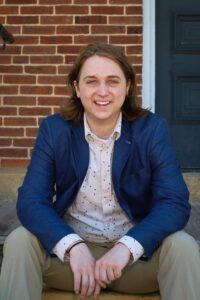Bill Connors, Andrew Hysell, Goodwill Obieze, Avery Renk, and Rick Rose are running for the Democratic nominee in the Assembly District 48. State Representative Samba Baldeh is a candidate in Senate District 16m an open seat. The newly-drawn district includes parts of east Madison, the city of Sun Prairie, and part of Dodge County. Connors, Hysell, and Obieze did not respond to our request.

Avery Renk
Avery Renk’s responses:
What are your goals for your first/next term in office should you be elected?
Overhaul the school funding system. Get rid of revenue limits, abolish the voucher system, and use all that money going to private schools to get our public school teachers pay above the national average and fully fund special education.
Please describe your qualifications and what sets you apart from your fellow candidates.
1: Youth. I’m 25, and bring a lot of excitement and energy
2: Ties to community: despite being 25, I’ve lived in my district longer than all of my opponents combined
3: Ability to work and communicate across the aisle. I’m from a Republican farming family, and am really able to connect with rural folks, from voters to lawmakers, in a way most Democrats aren’t able to.
I went to Sun Prairie High School, before getting a BA and JD from UW-Madison. I currently practice as an attorney in my hometown of Sun Prairie. I’m a general practitioner, but I focus on Estate Planning, small business law, and contracts. I worked in the State Assembly with Representative Gary Hebl in college, and have earned his endorsement. I also work extremely hard, knocking over 2000 doors since getting on the ballot just over a month ago.
While UW-Madison is situated in Dane County, its role as an economic engine it benefits the entire state. UW-Madison also has unique needs that are different from the other Universities of Wisconsin. Please tell us how you would represent UW-Madison in the Legislature and encourage your colleagues from outside Dane County to understand the statewide benefit of a strong UW-Madison?
First, I’d represent UW-Madison with my two degrees. I owe my entirely livelihood to UW-Madison; nobody would be a stronger advocate for the University than me. I would continue to advocate for research and academic funding. Building Madison as a worldwide destination for academic and research success is crucial for making Wisconsin the best state in the Union – something I plan to get done.
I am pretty skilled at communicating the University’s values to those outside of Dane County. Since something from UW has made almost everybody’s life better, I try to focus on something that has benefited the person I’m talking to. In my life, this has usually been agriculture, but it can also be medicine or law. I also like to brag about WARF and the research side of Madison – people often hear less about that than the academic side.
State funding for higher education has fallen dramatically over the past several decades, resulting in a dependence on tuition and fundraising to replace decreased state support. A ten-year long tuition freeze coupled with previous state budget cuts has forced UW-Madison to make serious cuts, while other UW System campuses face devastating budget shortfalls. How would you address these concerns if elected?
Increasing funding to the UW System. I want to use the revenue from legal cannabis to fund our Universities, while cutting voucher systems will pay for K-12 teacher raises and special education funding.
The current legislative majorities have worked to delegitimize diversity, equity, and inclusion (DEI) efforts. Legislators have forced the university to reclassify DEI positions and a legislative audit of UW DEI programs is underway. UW-Madison as an institution understands diversity to be a value that is inextricable from its other values, including educational and research excellence. Tell us about your legislative priorities on diversity, racial justice, and their relation to the values you hold related to higher education.
Diversity is highly important to me. Interactions with students and professors of different backgrounds at UW-Madison taught me that no amount of reading can make up for learning from other people. I think challenges to DEI are disgusting and thinly veiled racism. As far as racial justice goes, my top two priorities are legalizing cannabis and rehauling the education system funding process – including a more equitable distribution of state funds. This tries to tackle some of the most important disparities in the short-term and the long-term.
There is no more important place for diversity than higher education. Most of our most difficult questions are answered at the University level, and there’s no way to get the correct answer to most of these questions without diversity.
Wisconsin ranks near the bottom of state funding for four-year post-secondary education, while state funding for two-year technical education is among the best in the country. How would you address this disparity in the Legislature?
As I mentioned earlier, legalizing cannabis and sending that money to our higher education systems.
Work on the 2025-27 state budget will begin shortly after legislators are sworn into office. What are your funding priorities?
As I mentioned earlier, overhauling the way we fund public schools. Beyond that, finally accepting the medicaid expansion and continuing to push for childcare funding.
PROFS has long advocated for paid family leave for all employees and is pleased that UW-Madison and the Universities of Wisconsin recently approved a modest six-week paid parental leave benefit. We believe this is just the first step and more needs to be done. Will you support initiatives like those offered by Governor Evers that would expand paid leave to state employees and create a paid leave insurance program for public and most private sector employees in the state?
I will always support measures ensuring paid parental leave for any employee.

Rick Rose
Rick Rose’s responses:
What are your goals for your first/next term in office should you be elected?
Strong schools and diverse educational opportunities; public safety and financial security; better government; sustainable communities, both rural and urban
Please describe your qualifications and what sets you apart from your fellow candidates.
I have served the residents of Dane County as a Board Supervisor for two terms. These residents represent 1/3 of the new Assembly District 48 for which I hope to earn the opportunity to serve as its first representative. I know the state intimately and have told interviewed and shared stories of residents and public officials from all 72 counties in Wisconsin as an Emmy winning producer.
While UW-Madison is situated in Dane County, its role as an economic engine it benefits the entire state. UW-Madison also has unique needs that are different from the other Universities of Wisconsin. Please tell us how you would represent UW-Madison in the Legislature and encourage your colleagues from outside Dane County to understand the statewide benefit of a strong UW-Madison?
This area of the state has unique needs; I mean all areas do, however in serving on the Dane County Board and working with representatives of the University, I recognize we are leaders and innovators. I would share those stories in the legislature and across the district. I worked with the UW Alumni association in doing just that trough a series of videos we created for Discover Wisconsin
State funding for higher education has fallen dramatically over the past several decades, resulting in a dependence on tuition and fundraising to replace decreased state support. A ten-year long tuition freeze coupled with previous state budget cuts has forced UW-Madison to make serious cuts, while other UW System campuses face devastating budget shortfalls. How would you address these concerns if elected?
The state has a surplus of dollars. It is time they are released and directed to where they will most benefit the residents of our state. Education and education is my top priority.
The current legislative majorities have worked to delegitimize diversity, equity, and inclusion (DEI) efforts. Legislators have forced the university to reclassify DEI positions and a legislative audit of UW DEI programs is underway. UW-Madison as an institution understands diversity to be a value that is inextricable from its other values, including educational and research excellence. Tell us about your legislative priorities on diversity, racial justice, and their relation to the values you hold related to higher education.
I have been an advocate for the most vulnerable communities through 40 years of volunteer work and public service. My record stands that I bring the underrepresented to the table wherever I can where decisions are being made for those with living experience. Now is the time to increase these priorities, not back off. Again, all eyes are on UW Madison and how this plays out, so we must do all we can to make sure the right message is being sent to other institutions that are at risk. Democracy is at risk in general, and that trajectory must be stopped, by all means.
Wisconsin ranks near the bottom of state funding for four-year post-secondary education, while state funding for two-year technical education is among the best in the country. How would you address this disparity in the Legislature?
Education is education. We have lost ground in the liberal arts 4 year option for various reasons. I would not look back nor point fingers. I would speak as a Professor from my alma mater. As a Phi Beta Kappa graduate of Beloit College, I have returned to teach there. My example demonstrates my beliefs in a four year system. I was the first in my family to graduate from such an institution, and I assure you, it has placed me in the position of running for this office because of all it offers.
Work on the 2025-27 state budget will begin shortly after legislators are sworn into office. What are your funding priorities?
There are many. My top priority is gun legislation. This impacts educational institutions. From kindergarten, children learn plans of protection if a mass shooting shall arise. I worked with the Campus Police and UW Madison a few years ago to create an active shooter video which explores what can be done – we need to fund those items. A red flag law must be instituted in WI; through it we can look deeper at assisting the victim we protect as well as the perpetrator’s deficits and needs.
PROFS has long advocated for paid family leave for all employees and is pleased that UW-Madison and the Universities of Wisconsin recently approved a modest six-week paid parental leave benefit. We believe this is just the first step and more needs to be done. Will you support initiatives like those offered by Governor Evers that would expand paid leave to state employees and create a paid leave insurance program for public and most private sector employees in the state?
I full heartedly will, and already I am advocating for these necessities not only on the UW level however across all strata of the working population.
